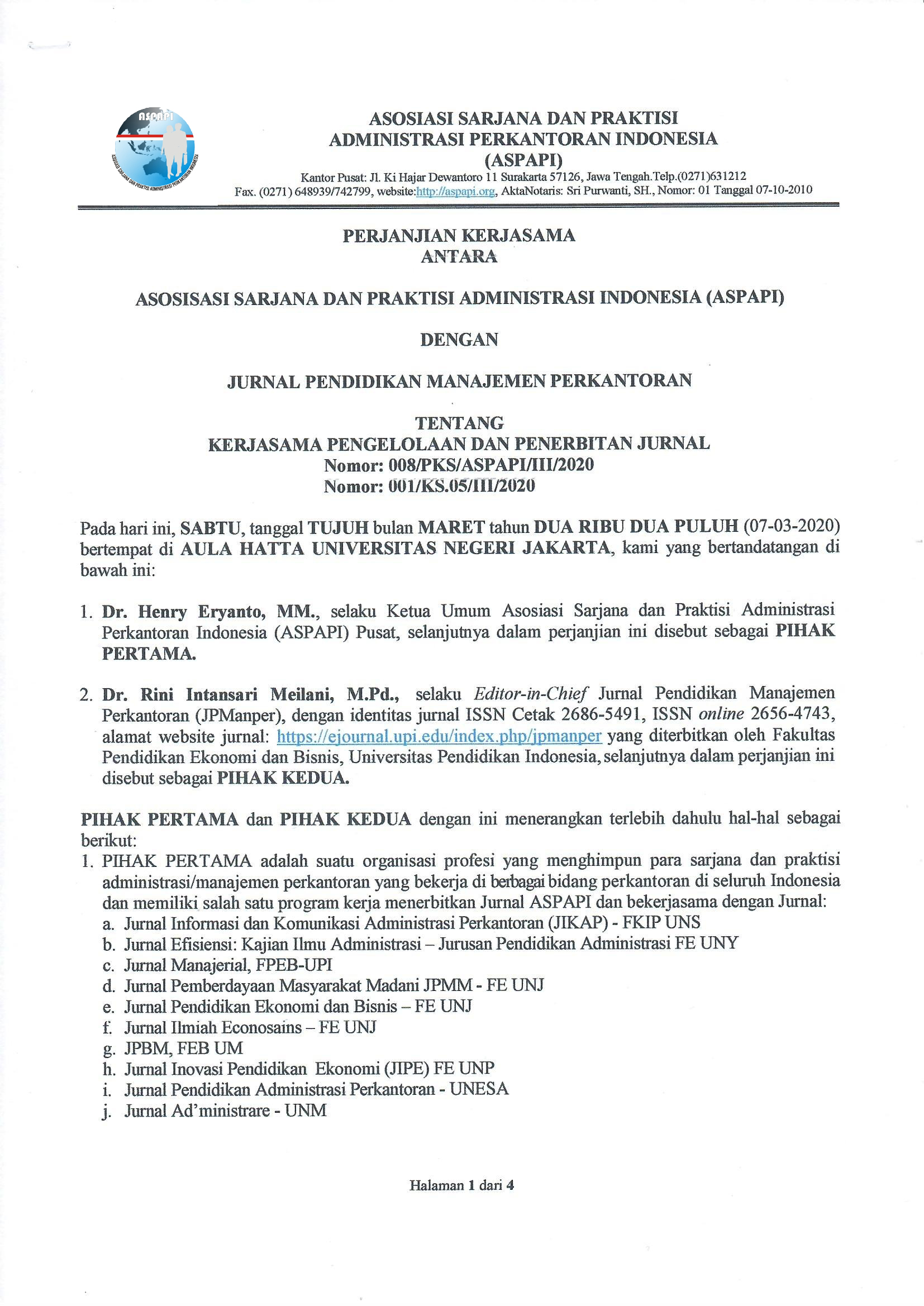Motivasi dan Kemampuan Individu dalam Mendukung Knowledge Sharing Dosen Tetap pada Perguruan Tinggi
Abstract
This study aims to determine the effect of motivation on ability and its impact on knowledge sharing in the permanent lecturer of the Universitas INABA Bandung. The sampling method uses saturated samples. Data retrieval is done using a closed questionnaire to 51 permanent lecturers at Universitas INABA Bandung. The analysis technique used in this study is path analysis. The results showed that motivation had a positive and significant effect on ability, motivation had a positive and significant effect on knowledge sharing, ability did not significantly influence knowledge sharing, and motivation and ability had a positive and significant effect on knowledge sharing.
Keywords
Full Text:
PDFReferences
Adhari, I. Z. (2021). Optimalisasi Kinerja Karyawan Menggunakan Pendekatan Knowledge Management & Motivasi Kerja (Vol. 1). CV. Penerbit Qiara Media.
Al-Alawi, A. I., Al-Marzooqi, N. Y., & Mohammed, Y. F. (2007). Organizational culture and knowledge sharing: Critical success factors. Journal of Knowledge Management, 11(2), 22–42. https://doi.org/10.1108/13673270710738898
Ansari, A. H., & Malik, S. (2017). Ability-based emotional intelligence and knowledge sharing: The moderating role of trust in co-workers. VINE Journal of Information and Knowledge Management Systems, 47(2), 211–227. https://doi.org/10.1108/VJIKMS-09-2016-0050
Armstrong, Michael & Taylor, S. (2014). Human Resource Management Practice, 13Th Edition. Retrieved from http://www.sims.monash.edu.au/subjects/ims5042/stuff/readings/rockart_1982.pdf
Bandura, A. (1993). Perceived Self-Efficacy in Cognitive Development and Functioning. Stanford: Depertement of Psychology, Stanford University.
Bhaktiaruddin, & Pudjiastuti, I. (2013). Pengaruh Motivasi Karyawan Pada Transfer Pengetahuan. Fokus Manajerial, Vol. 12, N.
Cahyorinartri, N. (2018). Motivasi mahasiswa berorganisasi di kampus. Jurnal Psikologi Insight, 2(2), 27-38.
Dessler, G. (2013). Resource Management Thirteenth Edition. Retrieved from https://drive.google.com/file/d/0BwDTzaBMxw2RZVEyeWd3aVZIMjA/view
Gagné & Deci. (2005). Motivation and Employee Performance: The Mediating Role of Abilities. Journal of Applied Psychology
Gangeswari, T., Roziah, M. R., Bahaman, A. S., & Maimunah, I. (2016). Knowledge sharing is knowledge transfer: a misconception in the literature. Journal of Knowledge Management, 20(4), 653–670. https://doi.org/doi:10.1108/JKM-11-2015-0427
Huang, M. C., Chiu, Y. P., & Lu, T. C. (2013). Knowledge governance mechanisms and repatriate’s knowledge sharing: The mediating roles of motivation and opportunity. Journal of Knowledge Management, 17(5), 677–694. https://doi.org/10.1108/JKM-01-2013-0048
Islamy, F. J. (2013). Pengaruh Budaya Organisasi Terhadap Implementasi Knowledge Sharing Dosen Tetap Universitas Pendidikan Indonesia Bandung Tahun 2013. 1–13. Retrieved from https://www.emeraldinsight.com/doi/abs/10.1108/JKM-11-2015-0427
Islamy, F., Yuniarsih, T., Ahman, E., & Kusnendi, K. (2020). The role of organizational culture, knowledge sharing and job satisfaction in higher education. Management Science Letters, 10(16), 3957-3966.
Islamy, F. J., & Mubarok, D. A. A. (2019). Pengaruh Motivasi, Kepercayaan dan Komunikasi terhadap Implementasi Knowledge Sharing pada Perguruan Tinggi Negeri di Kota Bandung. Jurnal Indonesia Membangun, 18(03), 16-30.
John F. Rockart. (1982). The Changing Role of the Information Systems Executive: A Critical Success Factors Perspective. Sloan Management Review, 3–13. Retrieved from http://www.sims.monash.edu.au/subjects/ims5042/stuff/readings/rockart_1982.pdf
Kuo, Y. K., Kuo, T. H., & Ho, L. A. (2014). Enabling innovative ability: Knowledge sharing as a mediator. Industrial Management and Data Systems, 114(5), 696–710. https://doi.org/10.1108/IMDS-10-2013-0434
Lekhawipat, W., Wei, Y. H., & Lin, C. (2018). How internal attributions affect knowledge sharing behavior. Journal of Knowledge Management, 22(4), 867–886. https://doi.org/10.1108/JKM-02-2017-0081
Mangkunegara, Anwar P. (2017). Manajemen Sumber Daya Manusia. Bandung: Rosda
Nguyen, T. M., Nham, T. P., Froese, F. J., & Malik, A. (2019). Motivation and knowledge sharing: a meta-analysis of main and moderating effects. Journal of Knowledge Management, 23(5), 998-1016.
Pusparani, M. (2021). Faktor yang mempengaruhi kinerja pegawai (suatu kajian studi literatur manajemen sumber daya manusia). Jurnal Ilmu Manajemen Terapan, 2(4), 534-543.
Putri, S. O., & Wijayanti, N. S. (2018). Faktor yang mempengaruhi kemampuan berbahasa Inggris mahasiswa pendidikan administrasi perkantoran. Jurnal Pendidikan Administrasi Perkantoran-S1, 7(2), 155-164.
PRATOMO, D. (2020). Pengaruh Kecerdasan Interpersonal dan Motivasi Belajar terhadap Prestasi Belajar Siswa pada Mata Pelajaran Akhidah Ahklak di Kelas VII MTS Negeri 3 Kediri Tahun Pelajaran 2019/2020 (Doctoral dissertation, IAIN Kediri).
Reinholt, M. I. A., Pedersen, T., & Foss, N. J. (2011). Why a central network position isn't enough: The role of motivation and ability for knowledge sharing in employee networks. Academy of management Journal, 54(6), 1277-1297.
Riyadi, S. (2022). Peran Motivasi Kerja, Stres Kerja dan Kepuasan Kerja Terhadap Kinerja Guru. Jejak Pustaka.
Robbins, Stephen & Judge, Timothy. (2017). Perilaku Organisasi Edisi 16. Jakarta: Salemba empat
Setiarso et al.(2012). Knowledge Managament pada Organisasi. Graha Ilmu.Yogyakarta.
Tobing, Paul L. (2011). Manajemen Knowledge Sharing Berbasis Komunitas. Knowledge Management Society Indonesia.Bandung.
Undang-undang Nomor 20 Tahun 2003 tentang Sistem Pendidikan Nasional
Undang-undang Republik Indonesia Tahun 2012 tentang Pendidikan Tinggi
Van Den Hooff, B., & Ridder, J. A. (2004). Knowledge sharing in context: The influence of organizational commitment, communication climate and CMC use on knowledge sharing. Journal of Knowledge Management, 8(6), 117–130. https://doi.org/10.1108/13673270410567675
Wei, J., Stankosky, M., Calabrese, F., & Lu, L. (2008). A framework for studying the impact of national culture on knowledge sharing motivation in virtual teams. Vine, 38(2), 221–231. https://doi.org/10.1108/03055720810889851
Winata, I. K. (2021). Konsentrasi dan motivasi belajar siswa terhadap pembelajaran online selama masa pandemi Covid-19. Jurnal Komunikasi Pendidikan, 5(1), 13.
Yahya, S., & Goh, W. K. (2002). Managing human resources toward achieving knowledge management. Journal of Knowledge Management, 6(5), 457–468. https://doi.org/10.1108/13673270210450414
DOI: https://doi.org/10.17509/jpm.v9i2.66639
Refbacks
- There are currently no refbacks.
Copyright (c) 2024 Universitas Pendidikan Indonesia (UPI)

This work is licensed under a Creative Commons Attribution-ShareAlike 4.0 International License.
Jurnal Pendidikan Manajemen Perkantoran Statcounter View My Stats



